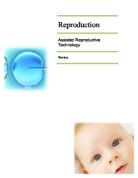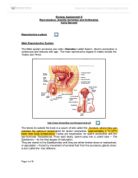Ovulation and egg retrieval
The female sex cell is called the eggs, eggs are produced in the female sex glands (ovaries), and they are the largest cells in the human body. The growth of ovarian follicles is controlled by hormones from the Pituitary gland in the base of the brain. The egg lasts 28-30 days before they ovulate this is when one or more eggs are released from one of your ovaries. This happens toward the end of the time you're fertile between periods. Normally only enough hormone is produced to allow one follicle to fully mature. With ICSI, Follicle Stimulating Hormone (FSH) is used to promote the growth of several follicles (multiple eggs). Doctors monitor your bloodestrogen levels and use ultrasound equipment to detect wether eggs are maturing and developing in the follicles, after your first week. Your second week you undergo more ultra sounds if the eggs are not maturing you FSH dosage may be increased. If the follicles exert signs of being fully developed, a human chorionic gonadotropin (hCG) is then injected this stimulates the follicles to mature further. Once this stimulus is injected 34-36 hours later the egg will be retrieved from the ovaries using a laparoscopy this is guided by ultrasound.
How the Intracytoplasmic sperm injection is performed
The eggs and sperm is then examined under a microscope so that the most appropriate one can be selected for the injection process. Once the sperm and eggs are prepared, the injection process can begin. Under high power magnification, a glass toll (holding pipet) is used to hold the egg in place, the sperm is then placed in the injection pipet tail first this allows the sperm to be injected head first. The injection pipet is used to penetrate and deposit one sperm into the egg. The ovum is then kept for 16-20 hours (overnight) to make sure the egg shows sign of fertilisation. The eggs further 3-5 days of incubation to make sure the eggs have been properly fertilised. Using a catheter Two-four eggs are then injected though the cervix, they are then left to develop. Not all eggs will develop but by adding a larger number of eggs it removes room for error. The remaining embryos can be frozen for further attempts if failure was to happen.
What to expect after treatment
The eggs will further develop in the uterus wall, ICSI related injections will be cared out to let the body know your eggs have fertilized. Your health throughout your pregnancy is important for you, and the growth and development of your baby. During pregnancy, you will experience physical changes and you may experience symptoms causing discomfort. Regular check-ups with your doctor to monitor your baby, various tests will be done to ensure your baby is in top health, blood tests will be done regularly to measure your hormone levels.
Benefits
Male infertility is described as having a low sperm count this makes it hard for men to then produce a baby. ICSI is a proceeded which now allows you to conceive a biological baby, by choosing the best sperm and best eggs. Before the development of ICSI the you would have had to rellie on sperm donor but not with ICSI.
Risks associated with Intracytoplasmic sperm injection
Thousands of children have been born around the world as a result of ICSI. There is no evidence that the incidence of physical birth imperfections is any different with ICSI or IVF as compared to the general population. Ovarian Hyperstimulation Syndrome (OHSS) is a response to ovulation stimulation with FSH and HCG. There is a 0.5-2% chance of it occurring it can be avoided with close monitoring from your doctor. With the insertion of multiple eggs there is a 35% chance of multiple pregnancies this is a problem with both the mother and foetuses. The effects on the health of the child in later years (15-16 years old) are largely unknown but there could be defects in the child’s hormonal levels.
How well it works
Intracytoplasmic sperm injection is a successful treatment if the egg and sperm are of good quality. Overall the ICSI success rates are 65%, although there have been reports of success at 80%. This success rate is for the ICSI treatment which is used to fertilize the egg and should not be confused with the IVF success rate which is somewhere between 25-35%.
ICSI helps men to fertilize and egg even if they have a low sperm count, this allows the father to be biological to the child. ICSI has very low risks and its success is quite high, although the treatment is quite expensive it shows great outcomes. With continual monitoring by a doctors this allows for a safe and healthy pregnancy. This procdure is extremely painless until the baby is growing and developing.










